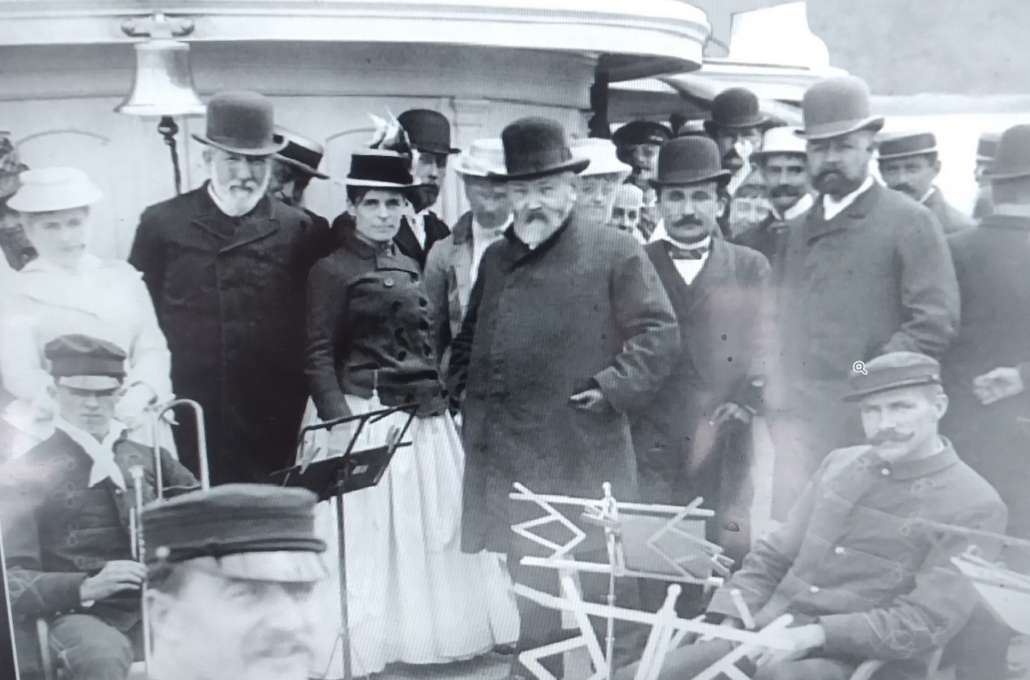REVIEW POTPOURRI: Benjamin Harrison

Benjamin Harrison with his Secretary of State, Maine’s James G. Blaine, and Representative Henry Cabot Lodge on a ship off the coast of Maine.
 by Peter Cates
by Peter Cates
Benjamin Harrison
The 23rd former President Benjamin Harrison (1833-1901) was the grandson of the 9th former President William Henry Harrison (1773-1841) and great-grandson of Benjamin Harrison (1726-1791), one of the original signers of the Declaration of Independence.
Like his predecessor/successor Grover Cleveland, Harrison was unwaveringly honest. Unlike Cleveland, he was a believer in the protectionist tariff system on imports, to benefit both agriculture and industry, and in decent pensions for Civil War veterans, particularly the disabled, and their widows, which Cleveland fought against tooth and nail.
(Harrison also championed voting rights and education for African Americans, which made zero minus headway with both parties, the 1880s and ’90s being known as the “Period of No Decision; ” anything to do with any rights for African-Americans was considered highly toxic.)
Unfortunately, Harrison had a stodgy colorless personality and could be very aloof, which didn’t serve him well while in office while also antagonizing a number of fellow Republicans.
He was also a fervently religious Presbyterian and led the family in daily Bible studies and prayers during the breakfast hour, with a tendency to give credit for any political success to Providence.
Harrison’s vice-president was New York representative Levi P. Morton (1824-1920) who, after Harrison lost his re-election bid, would become governor of his home state.
Harrison’s Secretary of State was our own James G. Blaine until he resigned due to ill health in 1892. (Blaine was a very close friend of Andrew Carnegie and stayed with the multi-millionaire at his castle in Scotland for several weeks in 1888.)
Benjamin Harrison was born on a North Bend, Ohio, farm to John Scott Harrison and his second wife Elizabeth. He had five brothers, two sisters and two half-sisters.
Harrison was married twice – first in 1853 to the former Caroline Scott (1832-1892) who gave him a son and a daughter; who was the opposite of Harrison in personality and made many friends with her warmth and generosity; and with whom he remained deeply in love for the almost 40 years they were married before she died of tuberculosis.
In 1896, Harrison married Caroline’s niece, a young widow Mary Scott Lord Dimmick (1858-1948) who was the same age as Harrison’s daughter and two years younger than his son. Both of them, objecting strenuously to the marriage, refused to attend the ceremony. The second Mrs. Harrison gave birth to another daughter a year after the marriage.
In early 1901, Harrison contracted influenza and died on March 13, at the age of 67.
Two very enjoyable 12-inch 78 shellac discs:
Frederick Stock (1872-1942) served the longest as music director of the Chicago Symphony for 37 years until his death at 70. The Victrola Red Seal #6579 features Stock’s vibrantly alive conducting of the Sibelius Valse Triste, Volkmann Serenade and Rimsky-Korsakov Flight of the Bumblebee, all three pieces then well-known light classics.
Meanwhile Leopold Stokowski (1882-1977) served, by comparison, a mere 26 years from 1912 to 1938 as music director of the Philadelphia Orchestra before handing over the reins to Eugene Ormandy whose tenure – 1938 to 1980 – would surpass Stokowski’s. A 1930s RCA Victor Red Seal #14472 has an intensely lavish and colorful performance of another light classic, the Liszt 2nd Hungarian Rhapsody. I also have a 1940s Columbia Masterworks 78 rpm of the same piece with the Philadelphians conducted by Ormandy which is differently colorful from Stokowski’s.
Responsible journalism is hard work!
It is also expensive!
If you enjoy reading The Town Line and the good news we bring you each week, would you consider a donation to help us continue the work we’re doing?
The Town Line is a 501(c)(3) nonprofit private foundation, and all donations are tax deductible under the Internal Revenue Service code.
To help, please visit our online donation page or mail a check payable to The Town Line, PO Box 89, South China, ME 04358. Your contribution is appreciated!


Leave a Reply
Want to join the discussion?Feel free to contribute!